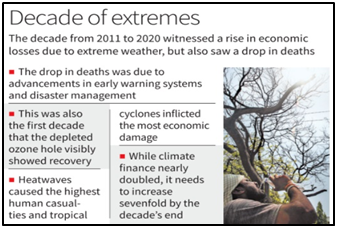The Global Climate 2011-2020: A Decade of Acceleration
06-12-2023
09:06 AM
1 min read

What’s in today’s article?
- Why in news?
- World Meteorological Organization (WMO)
- What is the WMO?
- News Summary: The Global Climate 2011-2020: A Decade of Acceleration
- About the report
- Key highlights of the report

Why in news?
- “The Global Climate 2011-2020: A Decade of Acceleration” is a report published by the World Meteorological Organization (WMO).
World Meteorological Organization (WMO)
- The World Meteorological Organization (WMO) is an inter-governmental organisation with a membership of 193 Member States and Territories.
- It originated from the International Meteorological Organisation (IMO - a NGO), the roots of which were planted at the 1873 Vienna International Meteorological Congress.
- Established by the ratification of the WMO Convention on 23 March 1950, WMO became the specialised agency of the UN, responsible for promoting international cooperation on -
- Meteorology (weather and climate),
- Operational hydrology and
- Related geophysical sciences.
- The WMO's Strategic Plan includes -
- Disaster risk reduction,
- The Global Framework for Climate Services (GFCS),
- The WMO Integrated Global Observing System (WIGOS),
- Aviation meteorological services,
- Polar and high mountain regions,
- Capacity development and Governance.
- The Secretariat, headquartered in Geneva, is headed by the Secretary-General and its supreme body is the World Meteorological Congress.
- WMO publishes - Greenhouse Gas Bulletin, Status of Global Climate, etc., reports
News Summary: The Global Climate 2011-2020: A Decade of Acceleration
About the report
- Published by WMO, The Global Climate 2011-2020: A Decade of Acceleration report was released at the UN Climate Change Conference, COP28.
- The report provides a longer-term perspective and transcends year-to-year variability in our climate.
- It compliments WMO’s annual State of the Global Climate report.
- It documents how extreme events across the decade had devastating impacts, particularly on food security, displacement and migration, hindering national development and progress toward the Sustainable Development Goals (SDGs).
- It is based is based on physical data analyses and impact assessments from dozens of experts at National Meteorological and Hydrological Services, Regional Climate Centres, National Statistics Offices and United Nations partners.
Key highlights of the report
- Warmest decade in the history
- The decade from 2011-2020 was the warmest ever in history.
- Also, there has been a rise in economic losses from extreme weather and climate losses.
- Number of casualties from extreme weather and climate events has gone down
- The reports highlight that number of casualties from extreme weather and climate events has gone down substantially over time.
- The 2011-2020 decade was the first since 1950 when there was not a single short-term event with 10,000 deaths or more.
- A major contributor to this decrease has been improved early warning systems, driven by improvements in forecasting, coupled with improved disaster management.
- Depleted ozone hole visibly showed recovery
- The report also says that this was the first decade that the depleted ozone hole visibly showed recovery.
- The success of the Montreal Protocol is the inspiration for the United Nations-led climate charter to convene annual Conference of Parties-meetings to address the challenge from greenhouse gases and climate change.
- The Montreal Protocol is a treaty that brought countries together to agree on phasing out ozone-depleting gases, particularly refrigerants.
- Thinning of glaciers
- Glaciers that were measured around the world thinned by approximately 1 metre per year on average between 2011 and 2020.
- Greenland and Antarctica lost 38% more ice between 2011 and 2020 than during the 2001-2010 period.
- The report cited no specific reference to Himalayan glaciers but had one mention of the 2021 Uttarakhand rock-avalanche that was triggered from a breach in the Nanda Devi glacier in the Himalayas.
- Extreme heat events and their impact
- The report underlined that human caused climate change significantly increased the risks from extreme heat events.
- Heatwaves were responsible for the highest number of human casualties, while tropical cyclones caused the most economic damage.
- Gap in climate finance
- As per the report, public and private climate finance almost doubled between 2011 and 2020.
- However, it needed to increase at least seven times by the end of this decade to achieve climate objectives.
Q1) What is the specialised agency of the UN?
UN specialized agencies are international organizations working with the UN, in accordance with relationship agreements between each organization and the UN. Specialized Agencies each have a process for admitting members and appointing their administrative head.
Q2) What is International Meteorological Organization (IMO)?
The International Meteorological Organization (IMO) was a non-governmental organization that was founded in 1873. The IMO was the first organization to exchange weather information between countries.
Source: Warmest decade in history also saw drop in deaths from ‘extreme climate events’: World Meteorological Organisation | World Meteorological Organisation | WMO


